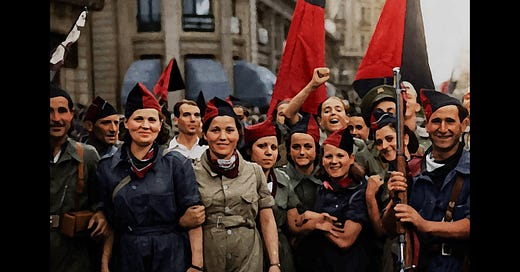George Orwell’s Homage to Catalonia, an eye-witness account of the Spanish Civil War, is one of those rare books that should be read by leaders in all fields. Entertaining, educational, and engrossing, it leaves an indelible mark on one’s mindset in our own troubled age.
Orwell was a great writer, insightful, honest, and remarkably prescient. He was also a sincere socialist who had his eyes opened to the evils of totalitarianism on both sides of the political spectrum. I am opposed to the whole idea of socialism, but it is not difficult to understand Orwell’s stance, and his books and essays, especially The Road to Wigan Pier, will give pause to even the staunchest capitalists.
In today‘s climate of cynicism, everyone has a fool-proof formula for utopia or the perfect organisation, but few have the breadth of vision or the empathy to hear the all-too-human concerns and aspirations of other people, and opponents are routinely demonised. This is precisely the mood that pervaded Spain and the whole of Europe in the 1930s, and it was a breeding ground for violent conflict.
Of course, the nihilism that fuelled both Fascism and Communism embraced deceit as a political weapon, but the western media, politicians, and intellectuals also undermined freedom and democracy with their self-serving distortions of truth.
What made matters worse was the bewildering complexity of the opposing alliances in Spain and the willingness of many prominent people on all sides to reduce the complexity to a spurious good versus evil template. There were good people who fought to defend the Republic, and there were good people who tried to bring it down, but where fear and hatred push wisdom and compassion aside, even supposedly good people will commit evil deeds.
The Republicans encompassed Socialists, Communists, Anarchists, Marxists, and Basque and Catalan separatists. The Nationalists included Monarchists, Falangists and other Fascist elements, and conservative Christian Democrats. And though the Nationalists attracted a lot of Catholic support, many Catholics were pro-Republican. However, the savage Leftist violence against the clergy, and the seizure and destruction of Church property turned Catholic opinion against a regime that encouraged the outrages. 7000 clergy were murdered, most between July and Nov. 1936.
Orwell witnessed the complexity and confusion, and simply tried to do the right thing: “If you had asked me why I had joined the (Republican) militia I should have answered: 'To fight against Fascism,' and if you had asked me what I was fighting for, I should have answered: 'Common decency.’”
His account of his brush with death is sobering to say the least: “As soon as I knew that the bullet had gone clean through my neck, I took it for granted that I was done for. I had never heard of a man or an animal getting a bullet through the middle of the neck and surviving it. The blood was dribbling out of the comer of my mouth. ‘The artery's gone,’ I thought. I wondered how long you last when your carotid artery is cut; not many minutes, presumably. Everything was very blurry. There must have been about two minutes during which I assumed that I was killed. And that too was interesting.”
Orwell’s literary gifts grace every page of this remarkable book: “The human louse somewhat resembles a tiny lobster, and he lives chiefly in your trousers. Short of burning all your clothes there is no known way of getting rid of him. Down the seams of your trousers, he lays his glittering white eggs, like tiny grains of rice, which hatch out and breed families of their own at horrible speed. I think pacifists might find it helpful to illustrate their pamphlets with enlarged photographs of lice. Glory of war indeed! In war all soldiers are lousy, at the least when it is warm enough. The men who fought at Verdun, at Waterloo, at Flodden, at Senlac, at Thermopylae - every one of them had lice crawling over his testicles.”
The tragic irony of a civilisation at the crossroads is powerfully drawn: “In the quiet back streets of Lérida and Barbastro I seemed to catch a momentary glimpse, a sort of far-off rumour of the Spain that dwells in everyone's imagination. White sierras, goatherds, dungeons of the Inquisition, Moorish palaces, black winding trains of mules, grey olive trees and groves of lemons, girls in black mantillas, the wines of Málaga and Alicante, cathedrals, cardinals, bull-fights, gypsies, serenades—in short, Spain.”
Orwell emphasises what too many people still refuse to acknowledge: “Early in life I had noticed that no event is ever correctly reported in a newspaper, but in Spain, for the first time, I saw newspaper reports which did not bear any relation to the facts, not even the relationship which is implied in an ordinary lie.”
The Spanish Civil War is a reminder that we are far too complacent in our presumption that civilised standards will prevail in our homes, workplaces, and communities regardless of the constant erosion and frequent violations that our indifference allows to go unchallenged. When good people abdicate their responsibility to lead, misleadership is given free rein. Homage to Catalonia is a must-read for leaders in all facets of life.





